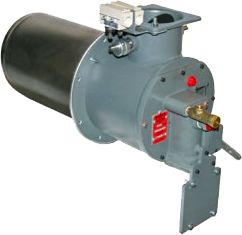Considerations When Replacing an Industrial Burner
Replacement of industrial burners can be necessary to ensure efficiency, safety, and emissions compliance of combustion systems. Using faulty industrial burners can lead to a range of problems that can pose significant risks to both personnel and equipment. Since it is necessary to replace burners that are no longer functioning as intended, it is important to consider factors that will indicate a replacement industrial burner is required.
Problems Associated with Faulty Industrial Burners
When faulty burners remain in use, serious complications can arise.These issues may or may not be obvious to the process/facility manager. Some examples of faulty burner problems include:
- Increased NOx and CO emissions
- Irregular combustion and burning
- Wasted energy and increased fuel consumption
- Uneven heating leading to thermal stress
- Variations in product quality
- Reduced process efficiency
- Frequent breakdowns
Key Indications that Industrial Burner is Necessary
Burners have a finite lifespan, and as they age, their efficiency and performance may decline. Operating equipment with faulty burners can be a serious hazard. It is important to be aware of indications that industrial burner replacement is needed.
Burner Age
If your burner has been in operation for a significant number of years and is showing signs of wear and tear, it may be time to consider replacement. High and frequent maintenance costs may be a sign that the burner is reaching the end of its useful life. Once maintenance becomes a financial burden, replacement may be a better option in the long run.
Burner Inefficiency
A significant decrease in the burner’s efficiency, indicated by reduced heat output or increased fuel consumption could be a sign that it is more cost-effective to replace the burner rather than continuing to operate it inefficiently.
The inefficiency of burners may be evident in signs such as frequent malfunctions, flame instability, or leaks. If operating costs, such as fuel and maintenance expenses, are consistently increasing, this could also indicate that the burner is no longer operating efficiently. Replacement may lead to long-term cost savings through improved performance and decreased fuel consumption.
Process & Parts Changes
Regulatory standards for emissions and environmental compliance have become increasingly strict. If your current burner is struggling to meet these requirements or requires frequent adjustments to stay within limits, replacement might be a more efficient way to ensure compliance.
In some cases, production demands change after the installation of a burner. Changes may include increased capacity requirements or adjustments in the type of product being manufactured. Burner replacement may be necessary to align with the new production goals.
If a manufacturer discontinues a burner model or replacement parts are difficult to source, this can lead to operational challenges such as extended downtime. In these situations, it might be more practical to invest in a new burner.
Benefits of Industrial Burner Replacement
Newer burner technologies offer improved efficiency, better combustion control, and advanced features that can lead to enhanced performance and cost savings. If your current burner lacks these features, an upgrade could be beneficial. Investment in a new burner might also be justified based on the potential return on investment.
Industrial burner replacement should be considered when a combination of factors, such as age, efficiency, safety, compliance, and operating costs, indicate that the current burner is no longer meeting the needs of the facility. A careful assessment of these factors, along with a cost-benefit analysis, can help determine the optimal time for replacement.
Combustion Plus is here to assist you with your industrial burner replacement needs. Contact us today.

 Combustion Plus Features a Wide Selection of Maxon Products – Now In Stock
Combustion Plus Features a Wide Selection of Maxon Products – Now In Stock